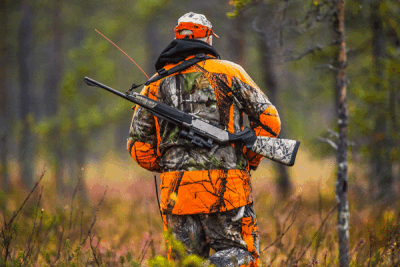
The Michigan DNR is reporting steady average growth for the numbers of hunting and fishing licenses purchased in 2023.
Shutterstock image
METRO DETROIT — According to statistics released by the Michigan Department of Natural Resources on Nov. 13, hunting license sales are generally holding steady in 2023 compared with recent years — even increasing among some demographics.
Some state officials believe that this bodes well for all Michiganders. Nick Buggia, chair of the Michigan Wildlife Council is among them.
“All Michiganders benefit because the health and vigor of Michigan’s outdoors, natural habitats and wildlife populations directly corresponds to the money generated from hunting and fishing license sales,” Buggia said in a press release. “Michigan’s management of the state’s wildlife and other natural resources relies primarily on the revenue from hunting and fishing license sales, not taxes.”
According to statistics provided by the Michigan Department of Natural Resources, a total of 456,731 people purchased hunting licenses and 1.18 million purchased fishing licenses through Oct. 31, 2023. They reported that hunting license purchases were down slightly by 0.79% from 459,490 bought in 2022 and that fishing license purchases were up 3.27% from 1.08 million bought in 2022.
Hunters and anglers aged 65 and older showed more consistent growth with 85,439 purchasing hunting licenses and 215,107 fishing licenses in 2023. This meant that, in this demographic, hunting license purchases were up by 2.66% from 2022 and fishing license purchases were up 5.53% from 2022.
First-time hunting and fishing license purchases also increased over last year with 40,119 first-time hunting license purchases made, which was an 0.86% increase, and 252,858 first-time fishing license purchases made, representing a 5.79% jump.
The number of women purchasing hunting licenses dipped slightly in 2023, but the number of women buying fishing licenses saw an uptick. The DNR reported that 44,18 women purchased hunting licenses through Oct. 31, 2023, which was down 0.39% from the same period in 2022, but fishing licenses purchased by women rose 3.29% to 236,099.
There also was an increase in the number of hunting licenses purchased by out-of-state visitors through Oct. 31. Nonresident hunting license purchases jumped to 22,351, which was an increase of 3.03% from the 21,693 nonresident hunting licenses bought through Oct. 31, 2022. Out-of-state visitors also purchased an estimated 212,803 fishing licenses over the same period. This is notable since nonresident hunters can pay as much as 10 times more than residents for some types of hunting licenses.
The DNR stated that proceeds from fees last year provided more than $65 million for conservation, habitat restoration and protection from invasive species.
“Hunters and anglers support our state and communities in so many ways, including being at the forefront of conservation ethics by embracing responsible practices, respecting wildlife and contributing to habitat restoration and protection efforts.”
Buggia pointed to other residual benefits that come along with deer hunting, including a reduction in deer-vehicle collisions and feeding the hungry.
Hunting proponents like Buggia state that hunting also provides food for the holiday season, some of which is often donated to those in need. They also cite that hunters cull about 300,000 to 400,000 deer annually statewide — animals that might otherwise increase the risk of collisions on Michigan roadways. Buggia said that deer-vehicle crashes over the last decade have typically numbered approximately 50,000 per year.
“November is known for three things in Michigan: deer firearm season, Thanksgiving and the number of deer-vehicle collisions. Without deer hunters, there would be less food and more collisions,” Buggia said in a press release. “(Additionally), Michigan hunters for decades have been donating venison to the hungry of our state. … It’s just one of the ways sportsmen and sportswomen give back to their neighbors and fellow citizens.”
 Publication select ▼
Publication select ▼





















